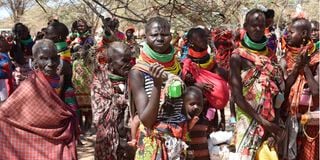Premium
EA talks climate change amid death

Residents wait for their rations of relief food distribution by President William Ruto at Nakaalei in Turkana on November 5, 2022. In upper East Africa and the Horn, the bodies of those who have starved to death are piling up.
The ongoing 27th Conference of the Parties (COP27) in the Egyptian resort city of Sharm el-Sheikh is the fifth time the COP summit has been held in Africa with Morocco, South Africa and Kenya having hosted it.
The organisers say they expect over 40,000 participants, which would make it the biggest ever for a climate summit in Africa.
The UN climate summit is an opportunity for African leaders to again put on the table their demands for action in the face of the myriad climate crises their countries face.
Africa accounts for 15 per cent of the world’s population but is responsible for only 3.8 per cent of global carbon emissions. In fact, 48 Sub-Saharan African countries, outside of South Africa, emit just 0.55 per cent of the cumulative carbon dioxide.
But while it bears the least responsibility for the world’s climate crisis, Africa is hit the hardest by its most severe consequences. Seven of the 10 countries most vulnerable to climate change are in the continent.
The worst-hit of African nations have called on the developed countries to fulfil their long-overdue pledge of climate financing worth $100 billion a year to the developing world to combat the crisis.
Drop in the ocean
Although that sounds big, it is still a drop in the ocean. The African Development Bank (AfDB) president, Akinwumi Adesina, holds that governments in Africa need up to $1.6 trillion during this decade to implement the continent’s commitments to the Paris Agreement on climate change.
Sharm el-Sheikh, however, is a perfect backdrop for a severe African regional crisis made worse by climate change. It is on the southern tip of the desert of the Sinai Peninsula and the shoulder of the Red Sea.
On July 23, 2005, the city was rocked by a series of deadly bombings carried out by the Islamist group Abdullah Azzam Brigades.
The deadliest terrorist attack in the history of Egypt—until it was surpassed by the Sinai mosque attack of 2017—left 88 people dead and more than 200 injured. The horrific latter attack killed 311 people and injured at least 128.
Egypt’s tough man, President Abdel Fattah el-Sisi, a former general, rose and consolidated power on a platform to beat back extremist violence, which he has done with deadly effect. However, privately for Egypt, COP27 is also an advertisement for El-Sisi’s security state project and a victory lap for having raised the tourist hot spot from its deathbed, to which the attacks on tourists had consigned it.
Going hungry
Down from Sharm el-Sheikh, along the western coast of the Red Sea, through the Gulf of Aden, and into the west side of the Indian Ocean, a record 36 million-plus people across the Horn of Africa are going hungry as Ethiopia, Kenya and Somalia experience the worst drought in 40 years. Standing on the beach in Sharm el-Sheikh, a keen nose might pick up the smell of wasted human bodies wafting in over the sea.
The Red Sea itself is under pressure. Environmental pollution has led to the loss of up to 70 per cent of its fishing wealth.
Although River Nile cuts through it, and to the north it is hemmed by a 950-kilometre Mediterranean coast, Egypt spends hundreds of millions of dollars yearly on fish imports. Ninety-five per cent of Egyptians live on the Nile or in its delta. The river provides almost all of Egypt’s water.
River Nile, meanwhile, is being polluted and abused by the East African nations that are home to its source, from where a significant portion of water flows to South Sudan, Sudan and on to Egypt in the north.
The health of the river is, undeniably, an existential issue for Egypt, as is the Red Sea. Over 10 per cent of global trade passes through the Red Sea every year, crossing some of the most strategic waterways in the world: The Bad al-Mandab at the southern entrance of the Red Sea and Egypt’s Suez Canal in the north. The Bab-el-Mandeb is a strait between Yemen on the Arabian Peninsula and Djibouti and Eritrea in the Horn of Africa, making it a critical geopolitical zone.
The dynamics of this geographical location explain why the Horn is important for so many international powers and has become a nerve centre of 13 foreign military bases—including those of the US, China, France, Japan and Saudi Arabia. Modestly sized Djibouti hosts six of them.
In the Horn, North Africa and the Middle East, climate change, among others, has turned scarce water into a deadly political contest. In upper East Africa and the Horn, the bodies of those who have starved to death are piling up.
Hopefully, as the powerful, rich and influential men and women of the world meet a short distance from these crises, up the road in Sharm el-Sheikh, it will be a little harder for them to turn their back on the tragic dress rehearsal of what awaits the world should humanity fail to turn the heat down on Earth.
Mr Onyango-Obbo is a journalist, writer and curator of the "Wall of Great Africans". @cobbo3





